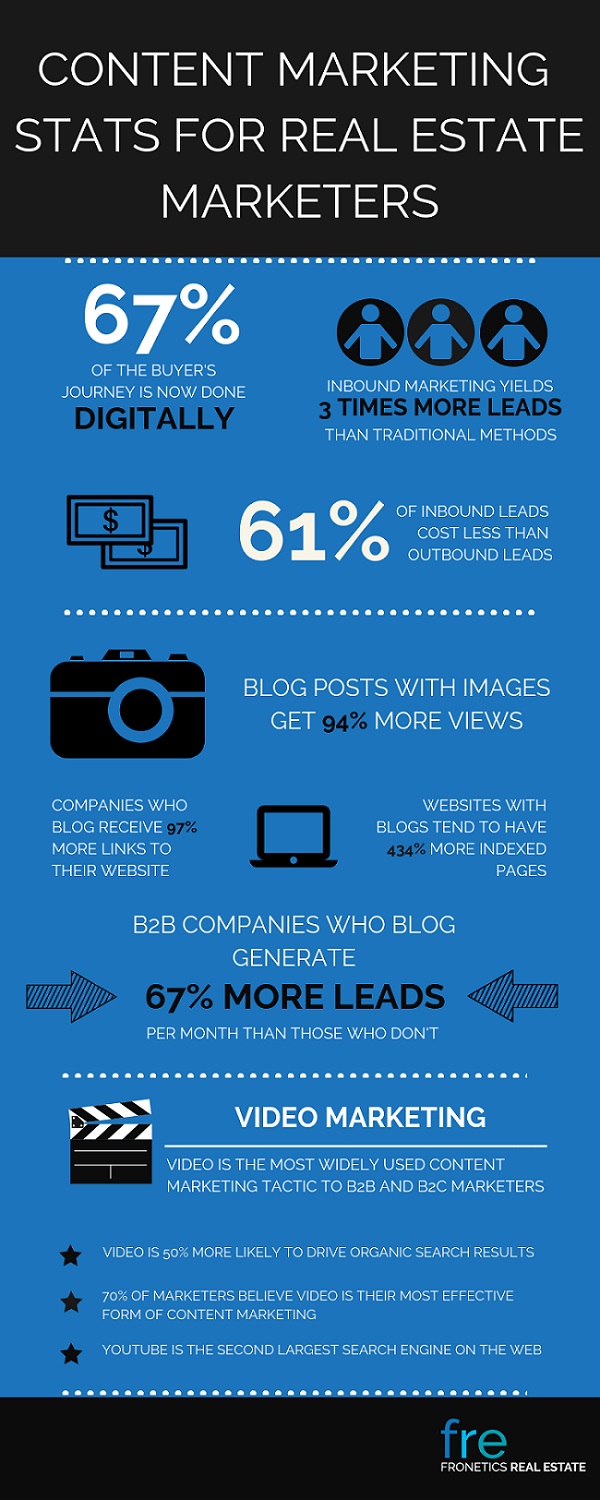Archive for Elizabeth Hines

3 Tips for Marketing to Millennial Real Estate Buyers
Home buyers are getting younger. Is your marketing strategy ready to meet the needs of millennial real estate buyers?
Consider this: more than a third of all home buyers came of age in the digital age. That’s right—millennials, those aged 36 and younger, now make up 34% of home buyers, which is the largest chunk of any generation buying homes right now.
These digital natives have a buying process that’s completely foreign to older generations, which means “traditional” marketing tactics won’t cut it when it comes to appealing to this demographic. Adjusting your strategy to resonate with millennials makes sense not just because it helps you reach this segment of the market, but also because it keeps you better positioned for the future of real estate marketing.
These three tips will help you adjust your strategy to market to millennial real estate buyers.
1) Be ready to guide them through the process
Millennials get a lot of bad press, as a generation that requires constant coddling and hand-holding. But to be fair, these young home-buyers are new to purchasing real estate—the vast majority (66%) of buyers ages 36 and under are first time home-buyers.
Buying a home is a complicated process, and millennials are looking for agents who will take the time to help guide them through the process. What does this mean for your marketing strategy? Placester’s Carolyn Berk suggests that “because guidance is so important to millennials, your marketing should emphasize your dedication to assisting customers every step of the way.”
This means offering resources and strategies rather than simply promoting available properties. For example, an eBook that guides first-time home buyers through the process is a great way to demonstrate your knowledge and commitment to supporting your clients through the buyer’s journey.
2) Help millennial real estate buyers save money
More than previous generations, millennials are saddled with student loan debt and often rely on sources other than just savings to finance their down payments. Simply put, they are looking to save at every opportunity.
Once again, content is your best bet for demonstrating to millennial real estate buyers that you are there to help them save money. Blog posts, testimonials, and case studies should detail your expertise in getting your clients the best possible deal. “Small things, like helping with contract negotiations or mortgage lender references, can go a long way with millennial buyers,” says Berk.
3) Go digital
This one probably seems obvious, but you’d be surprised at how many real estate professionals neglect their digital marketing presence. From social media to your website, marketing online is no longer optional, it’s expected. Millennial real estate buyers are heavily using the internet during their search and buying process, and your marketing strategy needs to be ready to meet them online.
First off, your SEO (search engine optimization) is key—your content needs to be readily available to potential buyers entering relevant search queries. “Aligning the content in your website to keywords that millennials use to search for homes in your region will help you pop up in search listings,” suggests Berk.
Your social media presence is also important. Millennials are checking Facebook, Twitter, Instagram, and Snapchat frequently throughout the day, and they should be finding your content. Take advantage of these visual media to promote your properties with photo and video content.
Marketing to millennial real estate buyers makes sense for your overall marketing strategy and helps keep your brand relevant and ready to adapt to the future.
Related posts:
- 5 Tips for Building a Successful Real Estate Social Media Marketing Program
- Real Estate Firm Grows Sales by 300% through Content Marketing
- Must-Know Social Media Strategies for Real Estate
Archive for Elizabeth Hines

Infographic: Content Marketing Statistics Every Real Estate Marketer Should Know
It’s a given that if you’re a real estate marketer, content marketing should be a big part of your strategy. These are the content marketing statistics you should know about.
Real estate marketers should definitely be adding inbound marketing (content marketing) to your arsenal if you want to reach occupancy at your property. This doesn’t just mean the occasional blog or social media post. We’re talking a full range of content: video, high-value resources, etc.
We’ve pulled some of what we think are the most interesting content marketing statistics out there right now. Take a look at our infographic at the bottom of this post. We hope it will help spark some ideas for you own successful real estate marketing strategy.
Content marketing statistics — the big takeaways
This shouldn’t come as a surprise: the biggest thing you should be taking away from these statistics is that a well-documented, consistent content marketing strategy absolutely needs to be part of your overall business model.
Consider this: 90% of home buyers look online to find their next home, and 70% of them will be getting a sense for who you are through your online content. And by content, we don’t mean ads. we mean the inbound marketing materials like blog posts, videos, case studies, ebooks, and other content that you produce.
The content you create, curate, and share is the single best brand ambassador you have. Too many real estate marketers take a passive approach to their online reputations, rather than taking control of this goldmine of a resource. Content marketing is about using your expertise and what’s special about your brand to become a resource for your audience, and to generate leads by developing meaningful and lasting relationships with your prospects.
We’ve pulled together this infographic of content marketing statistics to give you a full picture of the value of content marketing when it comes to real estate.
Infographic: content marketing statistics for real estate marketers
Data for the infographic came from REASS. (Made with Canva)
Related posts:
- 10 Quick Ways to Grow Brand Awareness
- 4 Types of Content You Need to Sell Real Estate (Besides Listings)
- How to Use Guest Posting as Part of Your Content Strategy
Archive for Elizabeth Hines

4 Real Estate Blogging Tools You Should be Using
If you’re a real estate marketer, you should be blogging. These four free tools can help you get your real estate blog started.
A real estate blog is one of the most effective ways to generate leads, improve brand recognition, and market your properties. At Fronetics Real Estate, we love blogging for tons of reasons. For one, you get plenty of bang for your buck: once you publish an effective post, it can continue generating leads even years into the future.
Are you ready to up your blogging game? Here are 4 of FRE’s favorite free online tools for real estate blogging that you can start using today.
Generate a topic for your real estate blog
Sometimes the ideas just flow, but often, coming up with fresh, engaging topics is like pulling teeth. The good news is, Hubspot’s Blog Ideas Generator is here to help.
Think Mad Libs: give HubSpot three nouns, and this powerful tool will give you topic ideas. It’s a great way to focus on topics where you want to cultivate your authority and to generate real estate blog post ideas for a topic cluster, in line with existing pillar content.
Is your headline engaging?
Judging a book by its cover may be a bad idea, but when it comes to blogging, the headline of your post is hugely important. So, regardless of how compelling your content is, if you don’t have an effective headline, it’s likely not reaching its audience potential.
ShareThrough has a tool that can help. The SharedCount Headline Analyzer lets you enter your idea for a title, and helps you refine and improve your headline. Run it until you get a good score (at least 75), using their tips as you go to edit and optimize the title of your real estate blog post.
Bump up your image game
We live in a world where, increasingly, the visual is key. A picture is worth a thousand words—but only if it’s a good one! Too often, bloggers forget this crucial aspect of online story-telling and settle for tired stock photos or the first result that comes up on Google Images.
One of the best online graphic editing and creation tools out there is Canva. We love this tool, which lets you save your brand colors and fonts, and create beautiful, original graphics for blog images, Facebook ads, postcards, eBooks, and more.
Boost your SEO
Generating organic traffic with your content is one of the main benefits of blogging. Your content helps inform search engines about your site, improving your rank in relevant search queries. But writing SEO-friendly content isn’t always a walk in the park.
Luckily, there are tools like Yoast SEO to help. This plugin helps you optimize your content, as it analyzes your writing, and gives you suggestions for optimizing it for Google’s algorithm.
We’ve said it before and we’ll probably say it again—when it comes to real estate marketing, a real estate blog is one of your most powerful assets. Give these tools a try—and let us know in the comments how they work for you.
Related posts:
- 5 Ways to Generate Real Estate Blog Ideas
- Infographic: Statistics that Prove Why Your Real Estate Marketing Needs to Include a Blog
- 4 Ways a Blog Can Help You Sell Real Estate
Archive for Elizabeth Hines

How to Use Guest Posting as Part of Your Content Strategy
Guest posting can help you build your reputation as a thought leader, grow your online reader base, improve your SEO, and expose your content to new audiences.
At Fronetics Real Estate, we use guest posting as a part of our own — and many of our clients’ — content strategies. Essentially, we partner with a relevant influencer or company, and swap content to post on each other’s blogs. It can be a really effective way to reach new, relevant audiences and provide interesting perspectives and voices to keep your core audience engaged.
What’s so great about guest posting?
Guest posting has all kinds of benefits. If you’ve identified a list of relevant influencers and companies with similar (and ideally wider) audiences, every time you post as a guest, your content and properties are exposed to a whole new segment of your target audience. We talk about this all the time when it comes to content marketing — your biggest asset isn’t your properties, it’s your expertise. Guest posting helps you establish your brand as a thought leader.
In addition to posting with real estate industry influencers and peer brands, guest posting for larger publications can be hugely beneficial, for obvious reasons. Not only are you introducing your brand and content to a broad audience, you’re associating yourself with an established authoritative source.
By the same token, having other brands author guest posts on your own blog is a great idea as well. When key influencers write for your blog, they bring their audience directly to you, allowing you to tap into a new and relevant set of prospects. Not only that, by inviting peers to contribute to your content, you’re forging and strengthening relationships within the industry.
Guest posting is great for SEO
Here’s a fact that’s often overlooked: Guest posting can significantly improve your search engine rankings (We’re always talking about how to improve your SEO.). Search engines use backlinks from other websites, particularly popular ones, as part of their algorithm for how search results are ranked. According to online business expert Sarah Peterson, in a guest article for the Huffington Post, “you can use the opportunity of your guest post to include 1-2 backlinks to strong pieces of content you want to rank for.”
Grow your email list
We all know that email marketing is hugely effective and profitable, if your email list is strong, and effectively segmented. Another often overlooked benefit of guest posting is that it has the potential to strengthen and enrich your email marketing efforts.
Because you’re being exposed to new audiences, both as a guest blogger and when guests write for your blog, you have the opportunity to target and cultivate new leads from relevant sources. Use guest posts as an opportunity to usher prospects to lead generation campaigns on your own website. Says Peterson, “if you’re not using this marketing strategy, you could be leaving a ton of email subscribers on the table.”
Involve your readers
As with any blogging efforts, you won’t get much bang for your buck if you simply author a guest article and do nothing to promote it. “You have to promote the article on your social media and through your own blog,” writes Tyler Zey of Easy Agent Pro. It’s also a good idea to solicit and reply to reader comments on your guest piece.
Are you a real estate professional who has authored a guest blog? Have you invited others to write for your own blog? Tell us about your experiences in the comments!
Related posts:
- 10 Quick Ways to Grow Brand Awareness
- 4 Types of Content You Need to Sell Real Estate (Besides Listings)
- A Visual Guide to Social Media Posting Frequency for Real Estate
Archive for Elizabeth Hines

4 Types of Content Real Estate Marketers Need to Be Using
As the real estate industry shifts, it’s time for marketers to shift with it. These four types of content are keys to marketing real estate in the digital age.
The real estate world has seen seismic shifts over the past few decades. Yet, it has been slower to change than other industries, which have been transformed nearly beyond recognition as the Internet continues to radically alter the way business is done.
The real estate industry is primed for innovation, particularly when it comes to marketing. As technology and digital media keep growing at unprecedented rates, real estate marketers have an opportunity to start putting different types of content to use to engage potential buyers and renters.
However, many are still slow to adopt content marketing. According to real estate investor Zamir Kazi, “Far too many in the real estate space simply still don’t get it when it comes to content marketing. I see so many still relying on old school methods vs. things such as social media, blogging and so on.”
For those willing to take advantage newer modes of marketing, the opportunities are vast.
If you’re a real estate marketer, consider making these four types of content part of your strategy:
1. Educational Content
You’ve probably heard the phrase “educational content” tossed around in discussions of content marketing, particularly in other sectors. Content that educates is highly preferred by buyers across the board and supports a fundamental principal of content marketing: your most valuable commodity is not your properties, but your expertise and thought leadership.
Creating content that educates your audience — for example, a piece about finding investment opportunities for your target client-base — establishes you as a trusted source of useful information. And it means your readers are far more likely to become your clients.
2. Branded Content
Creating effective branded types of content is all about ensuring that your audience is “consistently seeing your name, style, and thoughts,” while avoiding “being too promotional and one of those spammy real estate-types,” writes Forbes contributor Steve Olenski.
James Becker, CEO and founder of Fusion Growth Partners, suggests that the “story” of a brand should be at the root of all content and marketing efforts. “An agent’s story, if expressed well, conveys in an immensely impactful way, insight into that individual’s character, passion and commitment to their clients,” he says. “The story can create an almost tangible expectation for the reader to the level of service and authentic connection they will receive as a client.”
3. Email Content
Getting email content marketing right can be tricky. Of course, step one is gathering an email list. Olenski suggests that “When you think about your email marketing strategy, your first thought should be: ‘What content or experience can I create that will make someone give me their email?’”
Once you’ve established a list of emails, you can experiment with different types of content, and refine your list, segmenting it into different buyer types. Email marketing is a great place to experiment with automation.
4. Entrepreneurial Content
“Real estate is similar to entrepreneurship in that it requires sourcing projects and adding value through the process,” writes Olenski.
For example, according to Joe Pierson, CEO of BigKeyRealestate, “Agents should try to tap into the huge income potential of people who work in tech by framing real estate as an entrepreneurial endeavor suitable for their backgrounds. This is definitely difficult for the average real estate agent to do, but could open up a wealth of new buyers to work with.”
The bottom line is that content marketing is about generating value for customers and finding the types of content that cement your reputation as a trusted knowledge-source.
Related posts:



